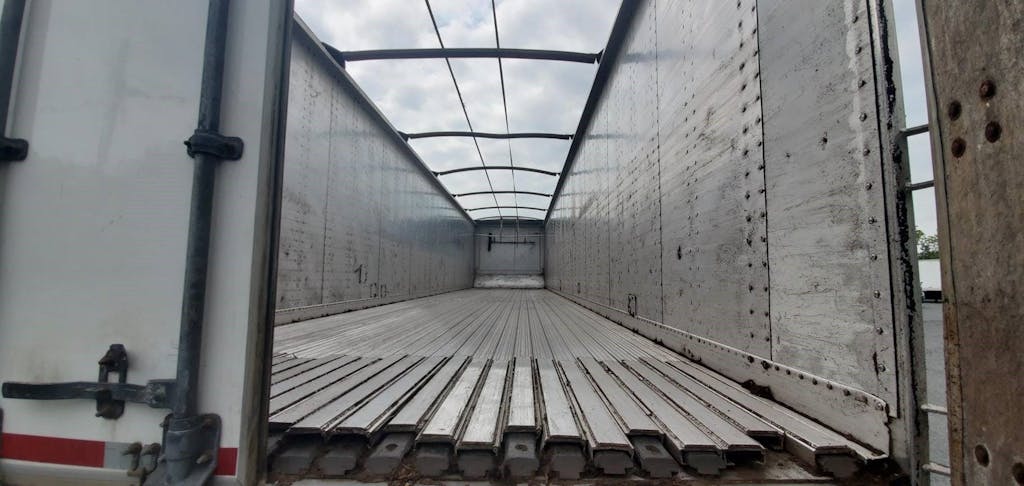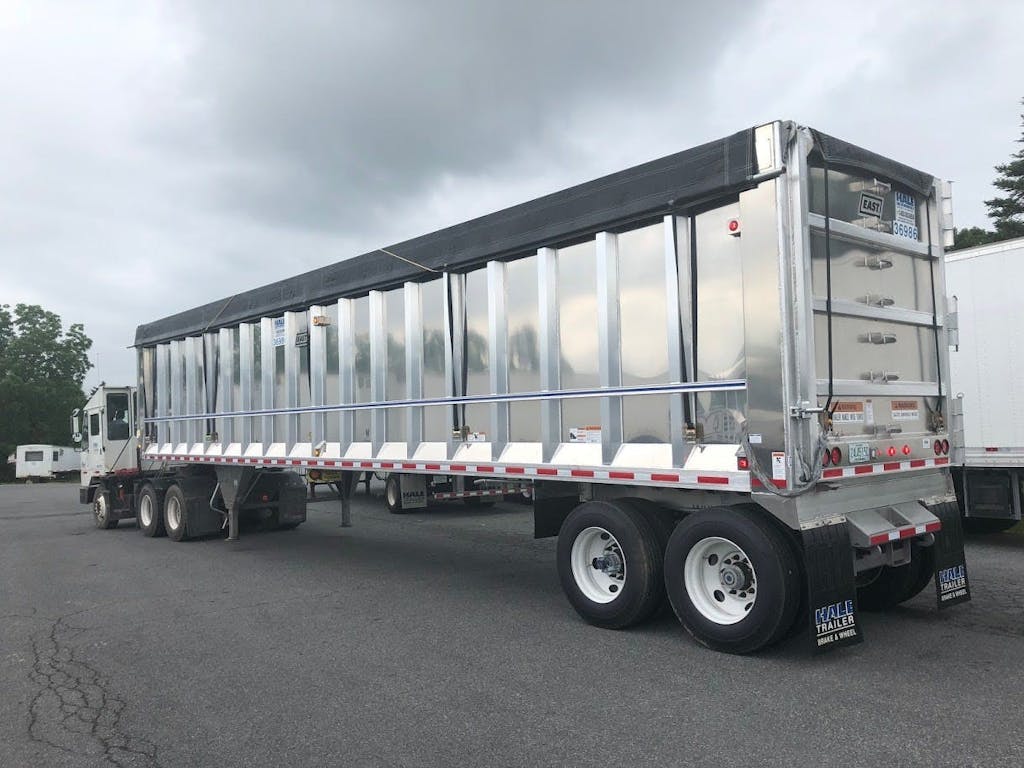How Self Unloading Trailers Can Help with Efficiency and Safety
October 31st, 2019
Delivering heavy, bulk goods and materials can be a time-consuming and strenuous endeavor. Unloading a trailer full of aggregate like mulch, or pallets of paper not only presents a challenge, but safety hazards, too.
With the help of a self unloading trailer, the process of delivering these types of cargo becomes far easier. In contrast to a tipping or dump trailer, which has to be lifted and tilted to unload, the self unloading, or moving floor trailer, stays level during unloading. This helps prevent accidents and simplifies the delivery process for the operator.
If you’re looking to purchase or rent a walking floor trailer, there are a number of options to consider. Understanding the differences will help to make the best choice for the type of load you’re delivering, and also assist in deciding to rent or purchase a self unloading trailer.
How Does a Walking Floor Trailer Work?
A walking floor trailer functions with the assistance of a hydraulic system that moves the floor in phases, thus unloading material directly off the back of a trailer without being tipped.
This is especially helpful for loads that are being delivered in confined spaces like a tunnel or warehouse. It also provides an extra layer of safety in adverse conditions like wind and rain, or when unloading on uneven surfaces.
Trailers are built to accommodate various types of materials. Walls or floors can be manufactured to be thicker, made of different types of metal, and even treated to withstand wear and tear associated with repeated use. Floor slats, which are controlled by the hydraulic system, are designed to move and hold specific types of loads, so it’s helpful to know which floor material is best for goods.
Walking Floor Trailer Dimensions
When choosing a walking floor trailer for rent or purchase, dimensions are given in feet for the length and height, and in inches for the width.
- Standard lengths are 43’, 45’, or 48’, but can also come in 50’ or 53’
- Standard width is 96” or 102”
- Standard height is generally 12’ or 13’
Additionally, trailers can come with an open-top, or closed, depending on the type of load. Self unloading trailers moving recyclables are often hauled in larger trailers due to more cubic space available. This ensures fewer trips back and forth.
Walking Floor Trailer Hydraulic System
The secret to self unloading trailers lies in their use of hydraulics to move materials out of the back of the trailer. The hydraulics are typically located beneath the floor of the trailer, which operate a series of slats that move in a cycle.
The number of slats comes in multiples of three, which enables some slats to remain static, while the other alternating slats move backward. A phase looks like this:
- First set of every third slat moves together in a backward motion
- Second group of every third slat moves backward
- Final group of every third slat moves under the load
- All slats move together towards the end of the trailer, moving the entire load forward
A moving bulkhead pushes material out of the trailer to ensure that nothing is left in the trailer and assists with an easier cleanup.
Heavier loads may use fewer slats made of more durable material, such as steel, while lighter loads use fewer slats made of standard aluminum. Slats also come in different thicknesses to support the weight and can be designed to prevent leakage if you’re moving wet loads.
Efficiency and safety are the primary reasons to use a walking floor trailer. The time it takes an operator to manually unload material and clean out the trailer can hinder the delivery process and turnaround time.
With a walking floor trailer, most of the material is moved out of the trailer automatically, leaving far less cleanup for the operator. There are even self unloading trailer models that can be equipped with sweeping systems that clean the floor of the trailer as it unloads. This is especially helpful for loads that run the risk of cross-contamination, like soils or feed.
Safety Tips
Safety is a top concern for trailer operators, regardless of the freight they carry. With heavy loads, the safety hazards only increase due to the laborious process of unloading and operating the trailer. A self unloading trailer allows operators to stay clear of material while it’s being unloaded and avoid hazards associated with a tipping trailer.
Even with the automation of a walking floor trailer, there are some safety tips to keep in mind.
- Always be mindful when opening the doors and ensure that the hydraulic system is turned off when opening and closing doors, and when the vehicle is in motion.
- Never stand inside the trailer or go underneath while the floor is moving.
- Be mindful of moving parts that can cause pinching, making sure that loose clothing is clear of hydraulics.
- Do not perform maintenance while the hydraulic system is on.
- Some surfaces can become hot while the system is on, so be cautious when operating.
- Never leave the trailer unattended while in operation.
When to Consider a Walking Floor Trailer
Walking floor trailers have revolutionized the way heavy goods are transported. If you’re considering a new or used walking floor trailer, here are the industries they are most appropriate for:
- Agricultural
- Refuse and Recyclables
- Wood and paper products
- Aggregate
- Products carried on pallets
Self unloading trailers are particularly beneficial in these industries because of their ability to quickly move heavy loads with reduced mess. The following are examples of common loads transported in walking floor trailers:
- Agriculture: Animal feed, fertilizer, compost, produce
- Refuse: Loose trash, cardboard, debris, scrap metal, recyclables
- Wood: mulch, sawdust, paper, lumber
- Aggregate: dirt, small rocks, pellets
Walking Floor Trailer Models from Hale Trailer
Hale Trailer maintains a variety of self unloading trailers at most of our 12 trailer rental locations. We provide expert service to help you choose the right trailer for your needs. The following are the most common models that we have in stock to serve your needs.
Open-Top Walking Floor Trailers

Open-top walking floor trailers come equipped with a tarp secured over the top of the trailer to keep loose material from blowing out. This is ideal for transporting dirt, soil, and similar materials.
Once the tarp is removed, the top of the trailer is completely open, which can assist in airing out and cleaning the trailer.
Aluminum Refuse Walking Floor

Walking floor trailers are commonly used to haul different types of refuse like recyclables. Floors are constructed of aluminum due to its versatility and durability in hauling loads that consist of various materials.
Due to the aluminum construction, these trailers typically move loads that are lighter in weight. Hale Trailer has a wide variety of aluminum trailers for sale and rent from manufacturers like EAST and MAC.
Closed-Top Walking Floor Trailers
Closed-top walking floor trailers provide an extra level of security and safety by ensuring that loads are completely contained. A closed-top can also prevent adverse weather from affecting a load.
Closed-top self unloading trailers are heavier due to the extra material used to enclose the trailer, so it’s important to consider the weight of the load being carried to choose open- or closed-top.
Hale Trailer Brake and Wheel, Inc. specializes in providing the highest-quality new and used commercial trailers in North America. We maintain a full inventory of trailers at each of our locations and are committed to making your trailer purchase or rental convenient. If you need help decided which walking floor trailer is right for you, contact one of our trailer experts to discuss options and availability.
All the information on this website – https://www.haletrailer.com – is published in good faith and for general information purposes only. Hale Trailer Brake and Wheel does not make any warranties about the completeness, reliability and accuracy of this information. Any action you take upon the information you find on this website, is strictly at your own risk. Hale Trailer Brake and Wheel will not be liable for any losses and/or damages in connection with the use of our website.
